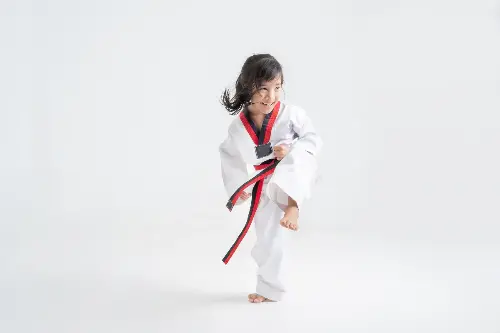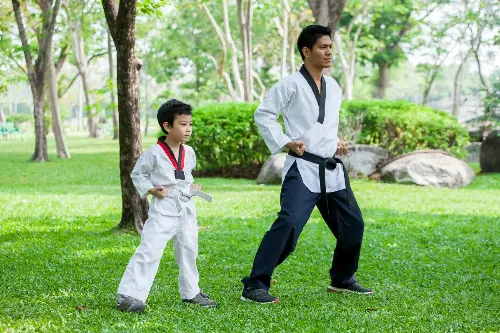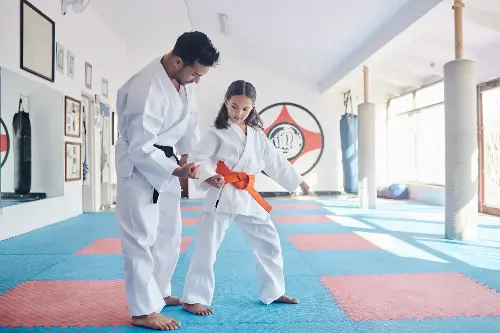Martial arts, often viewed through a narrow lens of kicks, punches, and physical prowess, are in reality repositories of deep life lessons, especially beneficial for children. While the physical benefits are undisputed, the less visible mental, emotional, and social gains deserve the spotlight. This piece delves into the myriad ways martial arts training transcends the physical aspect and moulds not just able fighters but well-rounded individuals.

Understanding Discipline and Respect
Discipline is the cornerstone of all martial arts training. From the meticulous way in which uniforms must be worn to the punctuality expected in every session, children absorb valuable lessons in discipline early on. Each class begins and ends with a bow, reinforcing respect not only for their instructors but also for fellow students and the art itself. This ritual underpins the importance of respect in all interactions and promotes a culture of mutual respect essential for personal and professional success.
Respect extends beyond the dojo into every area of life. Instructors often stress the importance of polite behaviour, and this message is rooted in traditional martial arts philosophies. This structured learning environment helps children appreciate the value of hierarchy and protocol, which are applicable in various life scenarios.
Confidence and Self-Esteem Building
Martial arts is an individual sport, yet it is practised in a community. Children are continually stretched and challenged, pushing their boundaries of comfort. Achieving new ranks, learning complex movements, and even participating in sparring sessions help build their confidence. With each accomplishment, children gain not only physical strength but also a strengthened belief in their own abilities.
Moreover, for many children, martial arts serve as a safe space where they can learn, fail, and succeed without judgement, which is invaluable for their self-esteem. Additionally, as children progress and reach new levels, they are often tasked to assist or lead younger students, which further enhances their leadership skills and boosts their self-confidence.

Emotional Control and Perseverance
One of the more profound lessons martial arts offer is the control of one's emotions. Martial arts require a calm, focused mind. Sparring sessions help children understand that anger or frustration only leads to demise in the ring. Therefore, they learn to maintain their composure, think clearly, and apply techniques calmly and efficiently.
The path to martial arts mastery is laden with challenges. Students learn early that perseverance is crucial. Continuous practice, sometimes repetitive and strenuous, teaches them the value of persistence. The lesson that every master was once a beginner and that dedication pays off is an encouraging reminder not just in martial arts but in any life endeavour.
Social Skills and Teamwork
Although martial arts can seem like a solitary pursuit, it is deeply rooted in community and cooperation. Training alongside peers, children learn to communicate effectively, work in teams, and support each other's growth. The dojo acts as a microcosm of society where children from various backgrounds come together with a common goal.
Team drills and sparring require children to collaborate and strategise collectively, fostering a sense of community and teamwork. Such interactions enhance a child’s ability to navigate social environments, making them better equipped to handle various situations in school and later in life.

Awareness and Self-Defence
One of the immediate benefits sought from martial arts training is self-defence skills. However, the training focuses on much more than just the mechanics of physical defence; it includes developing situational awareness and conflict avoidance strategies. Instructors emphasise the importance of being mindful of one's environment and avoiding confrontations whenever possible.
Such training enhances a child’s perception and judgement, skills that are crucial not only for personal safety but in developing a thoughtful, observant individual. The emphasis on conflict resolution and the responsible use of martial arts skills underscores the role of ethics in personal defence, an often-overlooked aspect of martial arts education.
Lifelong Healthy Lifestyle
Regular practice of martial arts offers physical fitness benefits that can instill a lifelong appreciation for health and wellness. The rigorous training not only improves strength, coordination, and cardiovascular health but also promotes a more disciplined lifestyle. Healthy eating and living habits are reinforced to maintain an optimal level of fitness to support martial arts activities.
The integration of meditation and breathing exercises in the routines helps relieve stress and promotes a balanced lifestyle. Such practices can steer children towards healthier responses to stress and a proactive approach to mental health.
Martial arts training offers children a robust foundation in disciplines that extend widely across personal and professional realms. Beyond the visible displays of skill, the dojo teaches life lessons in a comprehensive, engaging, and enduring manner. For parents considering extracurricular activities, martial arts stand out as not only a means to physical fitness but as a holistic developmental tool instrumental in shaping capable, respectful, and well-rounded future adults.
